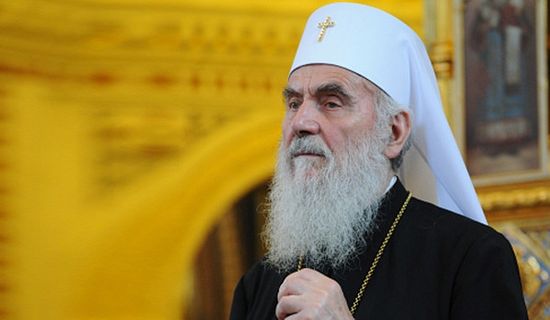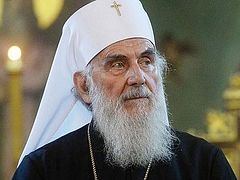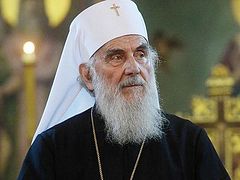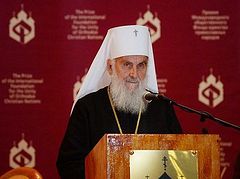Patriarch Irinej of Serbia, on Aug. 13th of this year wrote a letter to the Ecumenical Patriarch detailing his concerns about the situation in the Ukraine. While not addressing the canonical implications of the historical documents surrounding the 1686 submission of Ukraine to Moscow, it emphasizes two much more fundamental and serious issues that he sees as present in this situation.
The first issue that he brings up is the problem of nationalism, or what in current Church discussions has been called ethnopyletism. It is important to recognize that this ethnophyletism is not the natural love of one’s kin or country. When we talk about the heresy of ethnophyletism, this comes about as a result of a conscious effort by the intelligentsia to create a national identity and national consciousness out of political and ideological motives.
Our kin and country are naturally part of what God has given us to love when we are born into this world, and this love when active becomes a unifying force. Nationalism is a man-made ideology that attempts to be a unifying force—but of a different nature with a different goal. “Attainment of a national consciousness and hence membership in a nationality is a process that has to be achieved through ideological and social indoctrination….It is the role of the intelligentisia to transform an individual’s awareness of his relationship to a neighboring villager… or co-religionist into a consciousness of unity on a wider “national” level.”1 The goal and means of this unity is not the perfection of love, which brings about our oneness in Christ, but rather political coherence and independence. Nationalism brings about unity through appealing to pride in one’s identity and history2 and also attempts to build unity through creating an us vs. them mentality stimulating fear and suspicion of the enemy. This leads to a movement of circling the wagons and closing in on oneself.
A true Christian patriotism on the other hand consists not in pride in what is our own and fear of the other, but of loving of our own, being willing to defend it when necessary, accompanied by repentance and humility over our lack of perfect love and our inability to see and relate to those on the other side of our borders as truly our neighbor and brother. True Christian patriotism involves seeing and taking responsibility for the sins of our own nation rather than judging and blaming other nations. True Christian Patriotism brings peace to both ourselves and the world. It is a movement of opening out to the other.
The difference between nationalism and patriotism is that the first appeals to the passions of pride and fear, while the second is the struggle to love and repent. Nationalism involves the intellectual elite finding ways to convince people to believe and defend what they have created, while patriotism is the defense of what God has naturally given us according to the circumstances we find ourselves in. The fruit of nationalism is turmoil and conflict, hatred and suspicion—the exact opposite of love.
Whether it is nationalism, individualism, identity politics, or the “right to _____” (fill in the blank) the seed is the same. Anthony Kennedy in Planned Parenthood v. Casey (1992) states clearly the driving motive of man in our age—“At the heart of liberty is the right to define one’s own concept of existence, of meaning, of the universe, and of the mystery of human life.” This is a direct rejection of God as Creator and as the One who gives to His own creation a concept of existence, meaning and mystery that is found in Him alone. This heresy which has arisen today is man’s ultimate claim to be his own god.
It is this atheistic ideology that the Patriarch of Serbia identifies as the root of the conflicts in the Ukraine. It is the root of the conflicts in our own country and really world-wide. We are all neighbors who have been stripped by satan and left wounded and dying on the side of the road, needing Christ’s rescue. This directly effects the Church because the intelligentsia who are trying to build a national consciousness and identity are wanting to include in their man-made creation a man-made church, and as the Patriarch notes this has led to the rise in various places of the “church of the self-ordained”. These self-ordained want the liberty to define their own concept of what the Church is and they believe this is their right. They appeal for help to those in the west who have the same beliefs about everyone being able to determine our own existence and meaning.
When we look at the relationship of nationalism to the Church, it involves the self-willed establishment of a separate identity at odds with and independent of others, whereas the true Church consists in persons in communion who through obedience and love are moving toward being united into one in Christ. The Patriarch of Serbia appeals to Patriarch Bartholomew not to support or empower the states and individuals who are trying to use the faith of the faithful and the Body of Christ for their own man-made purposes, but to consider his responsibility to guard the harmony and unity of the Church.
The second issue that the Patriarch of Serbia brings up the question of the Ecumenical Patriarch’s understanding of itself and its position in the Body. He points out that there is a pan-Orthodox agreement in effect stating that no jurisdiction or Mother church may unilaterally declare a new authocephaly on its own. If the Patriarch of Constantinople decides to act unilaterally, without regard for the agreements that he himself was instrumental in bringing about, then this is understood as further support for the fact that he truly does see himself, not as the ‘first among equals’, but as “first without equal.”
This phrase “first without equal” is reference to a publication by Met. Elpidophoros Lambriniadis that is posted on Constantinople’s Patriarchal website.3 The article was written as part of the conversations in Ravenna between Catholic and Orthodox over the theological and practical understanding of primacy in the Church. During these conversations, Constantinople accepted an ecclesiology that locates the source of primacy in the person of the highest primate himself. Met. Elidophoros’s main point is that the primacy is not something received but has its source in the primate himself. He ends by saying, “ If we are going to talk about the source of a primacy, then the source of such primacy is the very person of the Archbishop of Constantinople, who precisely as bishop is one "among equals," but as Archbishop of Constantinople, and thus as Ecumenical Patriarch is the first without equals (primus sine paribus).” This ecclesiology puts the essence of the primacy in the person of the highest primate rather than locating the essence in Christ. It is an echo of the Catholic doctrine of the papacy. Consider the statements by Patriarch Bartholomew at the recent Synod “In the beginning was the Word… in him was life, and the life was the light of men.” (John 1.1,4) The beginning of the Orthodox Church is the Ecumenical Patriarchate; “in this is life, and the life is the light of the Churches.”4
If we look at the idea of primacy in St Leo the Great, Pope of Rome, we see that this is not what he teaches. The saint teaches that he is not the source of his power and authority as pope—rather they are received as a gift and a trust from Christ and from the people.5 What is received is not given to him absolutely or exclusively. St Leo teaches that this primacy is a power or attribute of Christ that interpenetrates the whole Church. The guarantee of unity is that we are all baptized into Christ and are receiving from Him as the one Head, this same headship or primacy when we become part of His Body. What is different among the different orders of the Church is the scope of the administrative responsibility and power, not the essence of what is received. The layman uses his primacy to become a head over his own body and soul, the priests, and even more so the archbishop have a wider scope for their primacy.6
Met. Elpidophoros criticizes the Moscow Patriarch for walking out and refusing to sign off on the Ravenna document and for insisting on the Traditional view that authority is received from Christ as source,7 mediated by the Church in the person of the other bishops,8 and witnessed to and confirmed by the faithful9 and in the commemorations in the dyptichs.10 (The dyptichs themselves are not the means of giving primacy, but are a way in which the will of the Church as Christ’s Body is expressed and confirmed.) The Metropolitan implies in footnote 4 that this walkout is not really theological, but primarily political—a protest against the Ecumenical Patriarch’s granting of autocephaly to the Estonian Orthodox church. The two really go together. The way in which the Ecumenical Patriarch is using its authority in these cases is a reflection of and acting out on its view of itself as the sole arbiter and source for its own authority. The basic belief seems to be that the scope of his authority is not determined by the Church, but instead remains in himself as unlimited by anything outside of himself. He does not recognize Christ as present in and acting in the whole Church. We see this in how in the current situation of Ukraine where the Ecumenical Patriarch is considering, it seems, unilateral action apart from consultation with or cooperation with the other Churches. To act unilaterally in this situation is a statement that the scope of his authority is not something bound by what the Church in its pan-orthodox agreements has allowed, but something which he can determine for himself. Patriarch Irinej warns that this is harmful to the Church. This doctrine of “first without equals” contains within itself a path to unity and way of creating order that is man centered not Christ-centered, and therefore bound to fail. No man can be a source of unity or life, this belongs only to God.
While I think there is globally much sympathy for the situation of Urkainian Orthodox who, having an independent country want also an autocephalous church, I hear the Serbian Patriarch warning that if the search for this is not separated from political and religious aspirations that are contrary to a Christ-centered unity and way of life, then only harm, not good can come from it.





However, this doesn't justify disobedience to the proper ecclesial authorities, nor disregard for proper ecclesial order. It takes patience, faith and prayer, not political maneuvering.
Interesting article, but who is the author?
(Your comment was posted after mine was submitted.)
I agree completely. Absolutist terminology like "First" would inevitably lead to abuse, --- as it did with the Pope of Rome; and as it is now doing with the Pope of Constantinople.
I get that it was meant as an honorific title to impart esteem for the Christ-like accomplishments of a given patriarchate.
But, as you point out, the greatest such accomplishment is humility, and the service of God and others (Mark 12:30,31; Luke 10).
As in my original comment, we need to drop this verbal construct: it only plays upon the weaknesses of men to impart PRIDE.
==============
I couldn't agree more.
It seems the root of such problems is the love of (secular) Glory.
St.Chrysostom did not want to become a Bishop because he was afraid
he would sin with the very beautiful female, called Doxa, Glory.
Nowadays most people are ...wiser than Chrysostom,
in fact they try all means to become bishops, of course they love Glory of the Bishop,
but actually they even look for a prettier Glory, that of Metropolitan,
then Metropolitan of a Greater City, then Patriarch, and ideally Primacy.
St.John Chrysostom was literally kidnapped by the people and was forced to be ordained.
The ultimate solution is to find a procedure to do this nowadays.
It is a peculiar (albeit honorific) concept that I knew would lead to (perhaps deliberate?) misinterpretation or manipulation by power-hungry hierarchs.
It certainly constantly requires explanation and rationalization in this era.
Best if we use "Honorable Representative", or something similar, to emphasize that power rests in a Council (under the Holy Spirit), not a Person.
============================